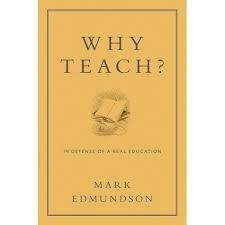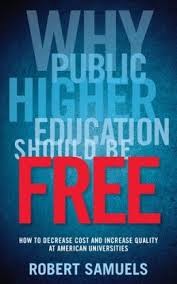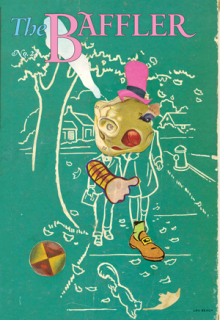
Your assignment this week: sixteen essays, ten short chapters, one elegant and righteous rant. Almost ready for classes starting next week at the UC, and well into the quarter or semester everywhere else. Everybody asks the annoying question about how the kids are doin' these days, education is simultaneously too expensive and underfunded, the check-out lady at Ralphs tells me she hated writing in high school, and the late if immortal Paulo Friere's one-time and always radical analysis is still the answer to the question asked in Mark Edmundson's new book, a collection of his accessible, fun, provocative writings, titled Why Teach? In Defense of Real Education. I guess the subtitle sort of answers the interrogative too, if you struggle a bit with the syntax, and imagine “real education” as it is described, helpfully, in the newest edition of the text used in Composition classes where I teach. But before I go there, please, somebody tell me why Ralphs (sic), absent an apostrophe, is plural and not possessive? Class? Class? Anyone? Ralph?
]
Dig that crazy cultural reference, kids, to a bad teacher as played by a very bad man indeed,

a speechwriter for Nixon, for God's sake, and a science denier and misogynist, too. Not atypical of fictional teachers, mostly bad or troubled or buffoonish. Hard to find a filmic representation of a real teacher, with politics (Freedom Writers) and nobody will ever do a feature film of Freire, though I understand that a documentary, Finding Freire, is in the works. So we get caricatures like the hammy and over-the-top Mr, Keating in Dead Teachers, oops, Poets Society. The inspiring right-wing Colombian math teacher, the local guy who teaches Shakespeare and hates other teachers and labor unions, all the other exceptions who prove somebody's dumb rule.

But I digress, just to make my point about “popular” and teachers. And because a film or book about the actual teaching would have to be about, you guessed it, the politics of teaching. Which brings me, first, to my favorite lines from the newest edition of The Anteater's Guide to Writing and Rhetoric, the text required of teachers and students of required, lower-division Composition at UC Irvine, where I teach (and do union advocacy, and try to be the opposite of Ben Stein) and which is part of what Comp teachers call teaching the “rhetorical situation,” even as it and they struggle with the real situation: remedial education, cuts to public education, the attack on labor, and the administrative “innovations” of, yup, more technology, two-tiered wage proposals and,two-tiered (real vs. online) teaching environments. More on that later.
Prof. Keith Danner, author of the intro to the book's section on “Argument and Research,” writes: “Then, too, we like to think that the critical thinking learned…plays a democratic role in the world. All to often, the dominant political discourse (which may include our personal opinions) remains a morass [Teacher said “ass”!] of unthinking prejudice. To do careful research, writing and thinking and to allow that work to confirm, qualify, or explode our unexamined assumptions is to create at least one spot in our minds where we think clearly about something. Hopefully, we then bring that critical thinking to our lives, possibly even becoming agents of social change.”

My own students will research a subject (a social or political problem) after reading an anthology of essays dealing with the fate of Vietnamese mail-order brides, sex trafficked slave-women, domestic workers, in Global Woman: Nannies, Maids, and Sex Workers in the New Economy. Not surprisingly, but still somehow shocking in the details, the “New Economy” has not been good to those women. Doesn't everybody know that already? Well, no. Do students? I'll find out late next week, when we preview some of the writing, from editor Barbara Ehrenreich (Nickel and Dimed), a member of Democratic Socialists of America (just sayin') to Susan Cheever (As Good as I Could Be) and impressive scholars who work in economics, women, race, disability rights, you get the idea. My own assumptions (of just how awful, if complicated, it is) were indeed “exploded” after reading about sex slavery in Thailand and Filipina domestic workers, who of course live and work far, far away from their own families. (I then watched, as much as I could, the documentary Whore's Glory, probably the most depressing, angry-making film I have seen lately, if you go in for that kind of thing.)
All of this “subject matter” has either everything or nothing to do with teaching, and the assault on public education. Or both, at the same time. How, exactly, to present, take apart, problematize, respond to the challenge of teaching critical thinking and writing about these issues? And, yes, still be a good teacher, and still give students what they want, or think they want, and what their parents and the university want them to think that they want, all of it costing way too much and built on competition instead of cooperation? Class? Class? Anyone?
Enter Mark Edmundson and Robert Samuels, two pedagogy dudes I admire, and whose new work I recommend. In Why Teach? Edmundson, who has written about reading and rock'n'roll, gets personal. Cause, you know, it's political. And because, yes, the personal is also the pedagogical. My absolute favorite part of his collection of previously published essays on literacy, civics, teaching, reading, writing starts with this problem of even recognizing good teaching, so buried is it in the consumer satisfaction model or the “banking” model, to get a little Paulo on you. He is a funny, fun, entertaining teacher. Students like him, it seems. But he's not there to be liked. Responding to a positive, if generically jolly and useless student evaluation about how fun and cool he is, Edmunson confesses he's glad to have been liked but disappointed: “Thanks, but no thanks. I don't teach to amuse, to divert, or even for that matter to be merely interesting. When someone says she 'enjoyed' the course – and that word crops up again and again in my evaluations – somewhere at the edge of my immediate complacency I feel encroaching self-dislike. That is not at all what I had in mind…I want some of them to say that they've been changed by the course. I want them to measure themselves against what they've read.”

I wish I had written that line. Did Edmundson get that from someplace Mr. Bib needs to know about? (Please post in comments if he is cribbing from classical philosophy or the Way-Back Machine or somewhere I have not yet located, but should! Jonathan, I mean you!). Measuring yourself against what you have read? I think that is my new mantra, slogan, along with “No pain, no brain” and the constant question “What is your thesis?”
Meanwhile, Bob Samuels, president of my union (go figure!) has put together a much more, if you will, practical or how-to book with the terrific title Why Public Higher Education Should Be Free, which is ambitious, short, easy to read, argumentative and, yes, not only advances the not at all radical idea of “free” public higher ed but seems to be, contrary to what my hero Thomas (What's the Matter With Kansas) Frank says, the first real explanation of where all the money goes. Best of all, in its provocative but somehow obvious conclusions, Samuels actually reorganizes the whole funding mess that is the for-profit, tax-breaks-for-the-wealthy model, with subsidizing by the feds of programs, instead of directly, teachers and students.
Both writers esteem teachers, teaching and classroom instruction. That means better

training, higher salaries, more encouragement of teachers. Samuels points out that most higher ed exploits TAs (graduate students) as low-cost teaching labor, but also enrolls them in Ph D programs in which they will secure degrees in subjects which, no, they will never actually teach, instead being absorbed into that great and growing low-wage army of adjunct faculty who teach what? You guessed it, Composition, that great, necessary, boot camp of democratic participation.
Yes, I am jumping quickly through what connects these books, which may seem pretty obvious. And made loudly, funnily, sardonically so by Frank, whose article “Academy Fight Song” in the most recent The Baffler I recommend, not only for its polemic but reliably wicked writing. Here's a bit of that, part of his effort to demystify and challenge the assumptions of the consumer satisfaction, class-trumping, banking on your way to the bank model:
“The university deals in dreams. Like other utopias – like Walt Disney World, like the ambrosial lands shown in perfume advertisements, like the competitive Valhalla of the Olympics – the university is a place of wish fulfillment and infinite possibility. It is the four-year luxury cruise that will transport us gently across the gulf of class. It is the wrought-iron gateway to the land of lifelong affluence.”

Of course, as Frank argues, it's not. For a lot of reasons, and in a lot of ways. But a lot of students and their parents are still sold the idea that it is. How many graduates are out of work just now, not because they didn't do well in school but because the entire economic model is two-tiered, unjust, organized to repurpose public wealth as private? Don't get me started on for-profit online virtual ed! Yes, somebody is profiting big-time on this dead, dead dream, built on a previous generation of workers and scholars and the Cold War and decent jobs and a pre-Reagan valuing of at least some scrap of a common good, not to mention an economy now profoundly, well, what exactly? Class? Anyone?
So many books, too little blog. Gotta get back to working on my syllabus, reading, writing a vocabulary quiz and, yes, messing with the new electronic platform (!) that forces me to spend much of my time not reading essays or writing comments on drafts but doing the same thing that a low-wage call center worker in India or Pakistan does: playing with a dumb machine, learning some new “technology.” Damn. I used to be able to teach – still can – with a book, chalk, and my own two feet, standing there and asking questions, Socratic-method style. No, it's not that I don't want students to know how to use the groovy new tools, do the vital and potentially “exploding” online research and evaluation required to be a vital, critically thinking citizen-scholar. I just don't want that to be the end-all, the overwhelming media (and media experience, like video games) that is, alas, the dreary message of that particular medium. I don't want education and the experience of learning to be so measured by this quotidian, digitized robot-clerk worldview and practice. I guess I want students, learning, teachers to be measured against what we've all read. But you already knew that.
Why Teach? In Defense of a Real Education, Mark Edmundson, Bloomsbury, 222 pgs.,
$ 24.00.
Global Woman: Nannies, Maids and Sex Workers and the New Economy, Barbara Ehrenreich N Arlie Russell Hochschild, Henry Holt, 328 pgs., $18.00
“Academy Fight Song” in The Baffler, No. 23, 2013 by Thomas Frank. Available online at The Baffler.com
Why Public Higher Education Should Be Free: How to Decrease Cost and Increase Quality a American Universities, Robert Samuels, Rutgers, 178 pgs., $ 22.95
Andrew Tonkovich hosts the Wednesday night literary arts program Bibliocracy Radio on KPFK 90.7 FM in Southern California.


One Reply to “Carping Diem! Teachers Rant. Teachers' Rant. A Teacher's Rant. It's Back-to-School Reading Week”